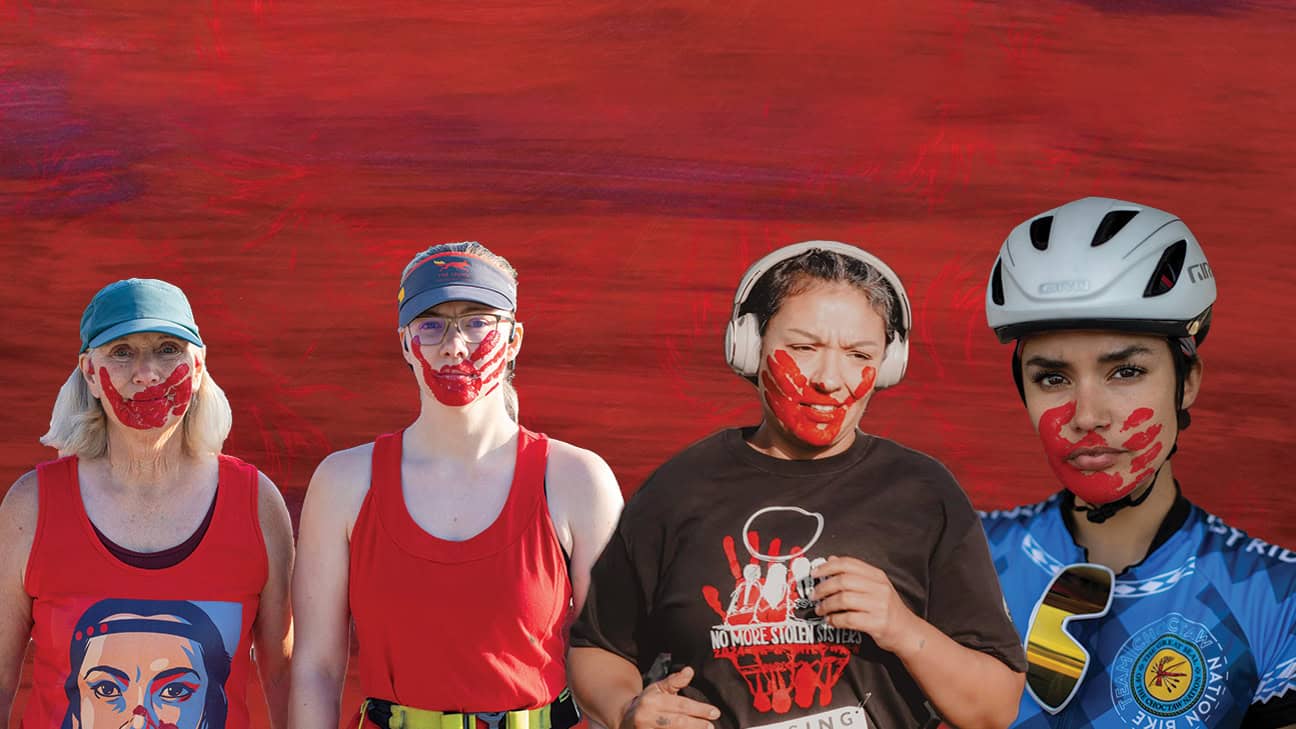
In recent years, the topic of MMIP has been thrust into the spotlight by activism, demanding change from local, state and national government.
2024 Missing and Murdered Indigenous People Movement Update
Published June 3, 2024By Kendra Germany-Wall
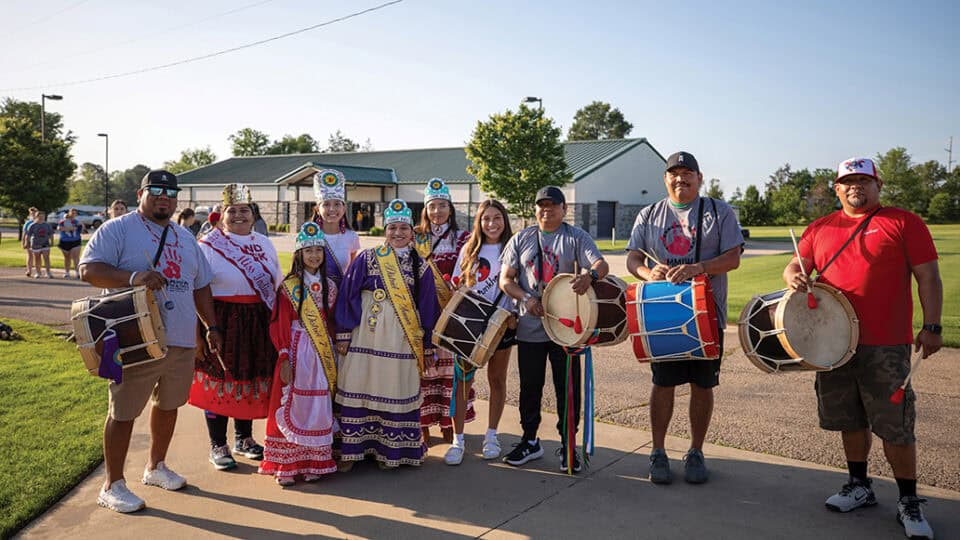
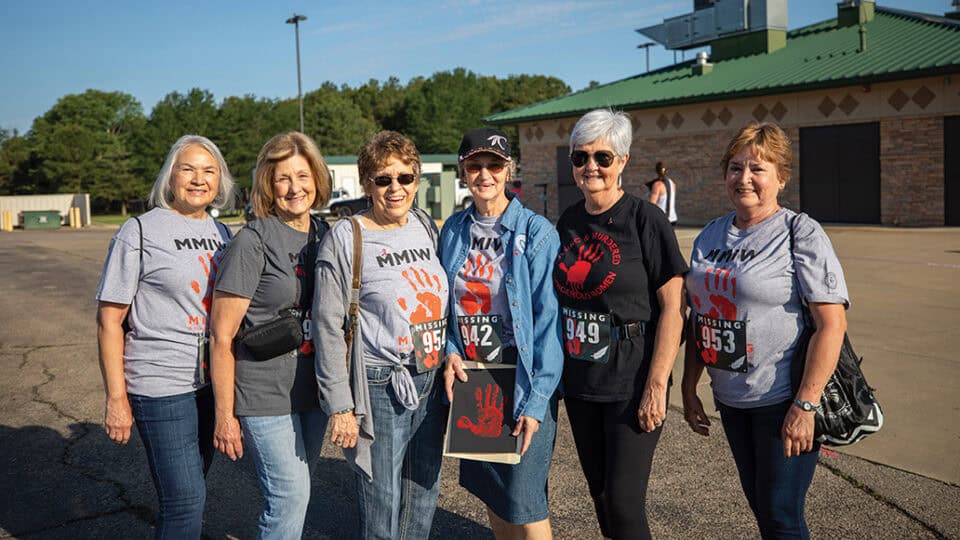
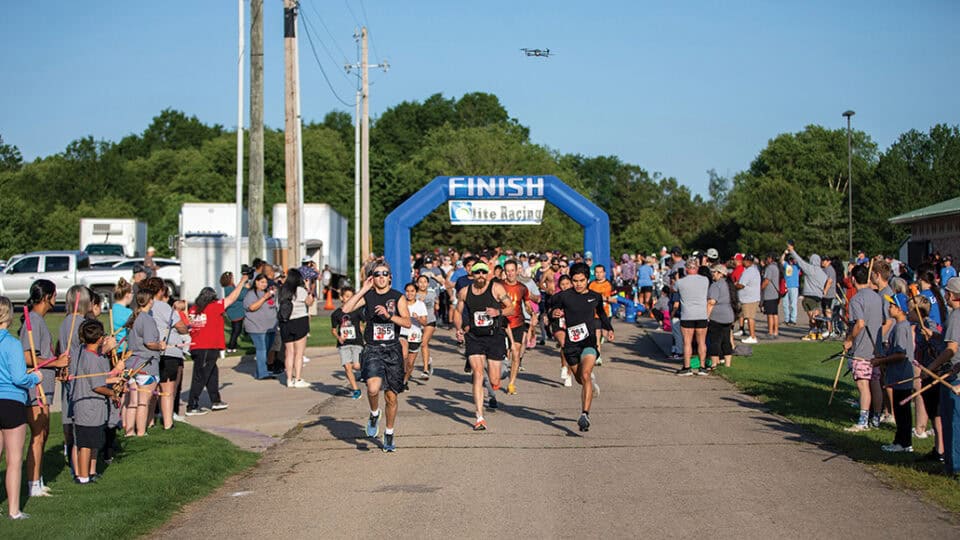
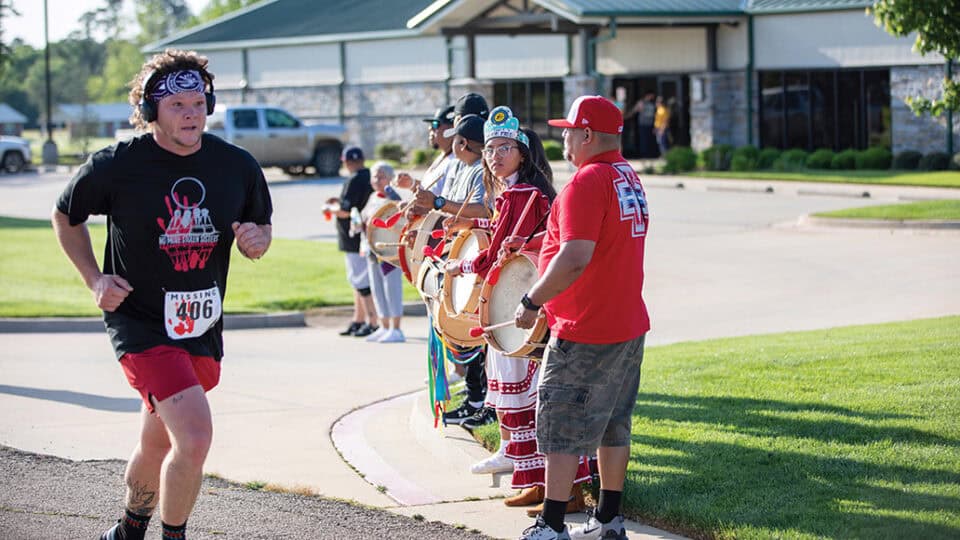
On May 14, hundreds gathered in Antlers, Oklahoma, to bring awareness to the Missing and Murdered Indigenous Women’s movement.
The Annual MMIW 5K/Walk is a way for members of the Choctaw Nation and surrounding communities to honor the lives and memories of their stolen sisters.
KeyShod Baker of Tom, Oklahoma, was among those in attendance to take part in the race and spread awareness.
“This is one of my favorite runs because of the meaning behind it and the purpose that it pushes to make not only Indigenous women safe but all women safe,” said Baker. “I think it is an amazing thing to get behind because, other than running, it’s highly important how we live on this earth. That’s what brought me out: the cause, the people, the community and, of course, a little fitness in the mix.”
The overall winners of the 5K were Ryahn Witt and Tiffanie Burchfield. Don Tidwell and Ruth Wayman were the winners of the 80 and over category.
Murder is the third leading cause of death for Indigenous women, according to the Centers for Disease Control.
As of January 2024, Oklahoma was number two on the list of Top Ten States for Missing Indigenous Persons, with 86 out of 840 nationally reported MMIP cases, according to the National Missing and Unidentified Persons System.
While thousands of Indigenous women disappear each year, their cases are less likely to be investigated by law enforcement than those involving other ethnicities.
The bodies of Native American women are 135 percent more likely to go unidentified than the remains of women of other ethnicities in the U.S., according to a paper published in the Criminal Justice Policy Review journal in March 2023.
This epidemic isn’t exclusive to women. The average age of an MMIP in America is 19.1 years old, and 69% of those missing were assigned male at birth, while 31% were assigned female.
According to research by the Transgender Law Center, since 1990, there have been at least 25 transgender and Two-Spirit Indigenous people killed or missing.
“The lack of reporting and knowledge about the plight of trans and Two-Spirit people in Native communities is one way that violence persists in such communities,” states the Transgender Law Center on their website.
A lot has changed since the Biskinik began reporting on this issue.
Within the Choctaw Nation, events like the MMIW 5K and the actions of many departments and services have raised awareness and visibility of the issue of MMIP.
One of the most prominent voices for the MMIP cause is the Missing and Murdered Indigenous Women-Chahta (MMIW-Chahta) organization.
Based in Calera, Oklahoma, MMIW-Chahta works tirelessly to raise awareness of Missing and Murdered Indigenous Women, educating on domestic violence and healing.
In a recent interview, Karrisa Hodge, President and Founder of MMIW-Chahta, gave an update on the organization’s activities since we last spoke.
For the first time, MMIW-Chahta hosted a Law Enforcement Appreciation Banquet at Tribal Headquarters in Durant.
“A lot of MMIP and MMIWs [Chapters] started because law enforcement wasn’t taking our cases seriously. One thing that I did when I started was I really fostered those relationships and grew them. I can’t say enough about how amazing our tribal police is within the Choctaw Nation Reservation,” said Hodge. “They call us when one of our tribal people goes missing; they help us do flyers now. It’s really become a partnership, which is beautiful because it’s so hard for either team to do it by themselves.”
To honor that collaboration, Hodge and her team wanted to show their thankfulness by hosting a banquet during Law Enforcement Appreciation Week.
During the event, Chief Gary Batton announced a proclamation designating May 15 as Tribal Law Enforcement Day in the Choctaw Nation.
According to Hodge, no other MMIP chapter in Oklahoma has ever been able to partner with law enforcement in this way before.
“No MMIP [chapter] and a tribal nation have ever created a proclamation before,” said Hodge. “That’s pretty cool.”
Other local law enforcement, such as Southeastern Oklahoma State University, Calera and Durant, were also invited to attend so they could collaborate, mingle and discuss MMIP issues.
Fostering relationships with law enforcement is essential to bringing awareness and helps raise the potential of solving cases.
“Since McGirt, you know, a lot of separation has happened, and we’ve seen that really harm our cases,” said Hodge. “We’re trying to find new avenues for them to have training and new avenues for them to collaborate.”
MMIW-Chahta also held a human trafficking training in Oklahoma City, and 26 members of law enforcement were in attendance.
The group also announced a new Vice-Chair, Jennifer Austin.
MMW-Chahta won an Oklahoma Centers for Nonprofits Oklahoma Nonprofit Excellence Award for “general impact.”
Regarding community work, MMIW-Chahta doesn’t just stop at missing and murdered cases.
“We have to kind of cover it all,” said Hodge. “Domestic violence, suicide, unhoused and substance abuse because all of those things make us [Indigenous people] more susceptible to murder.”
The group also helps to feed the unhoused and furnish the homes of those escaping domestic violence situations via donations they receive from the community.
According to Hodge, the group’s volunteers are amazing and are eager to help those who need it.
“We’re partnered with Webstaurant now, so they donate kitchenware,” said Hodge. “So, we’re able to give them glasses, silverware, plates, you know, things like that.”
According to Hodge, MMIW-Chahta collects items year-round. Those who would like to donate should reach out to MMIW-Chahta on social media to see what is needed.
The group hosts various events throughout the year. To stay up-to-date on what’s happening with MMIW-Chahta, keep up with open cases or get involved, follow them on Facebook at Missing Murdered Indigenous Women-Chahta.
In the state of Oklahoma, a new missing persons alert system, specifically for tribal citizens, is now in place.
The Kasey System is designed to inform not only law enforcement but also civilians when a Native person goes missing.
The system is for Indigenous people deemed critically missing (someone between the ages of 18 and 59 whose whereabouts are unknown and who is believed to have been abducted).
Leaders of the Choctaw, Chickasaw Cherokee, Muscogee, and Seminole nations are urging the Federal Communications Commission to establish a new event code to help locate missing and endangered adults—a crucial tool for tribal nations impacted by the MMIP crisis.
The potential code would alert the public if an adult goes missing through the IPAWS network to radios, televisions and cell phones, much like the Amber Alert for children. The leaders of the five tribes formally passed a joint resolution at a recent Intertribal meeting supporting the move.
The Justice Department recognized May 5 as National Missing or Murdered Indigenous Persons (MMIP) Awareness Day.
In recognition of MMIP Awareness Day, Attorney General Merrick B. Garland highlighted ongoing efforts to tackle the MMIP and human trafficking crises in American Indian and Alaska Native communities and other pressing public safety challenges, like the fentanyl crisis, in tribal communities.
“There is still so much more to do in the face of persistently high levels of violence that tribal communities have endured for generations, and that women and girls, particularly, have endured,” said Attorney General Merrick B. Garland. “In carrying out our work, we seek to honor those who are still missing, those who were stolen from their communities, and their loved ones who are left with unimaginable pain. Tribal communities deserve safety, and they deserve justice.”
In July 2023, the Justice Department announced the creation of the Missing or Murdered Indigenous Persons (MMIP) Regional Outreach Program, which permanently places 10 attorneys and coordinators in five designated regions across the United States to aid in the prevention and response to missing or murdered Indigenous people.
U.S. Attorneys and MMIP personnel engaged in events with tribal and law enforcement partners, communities, and stakeholders today across the U.S., and will continue to do so in the days to come.
The MMIP Regional Outreach Program dedicates five MMIP Assistant U.S. Attorneys and five MMIP coordinators to providing specialized support to U.S. Attorneys’ offices to address and combat MMIP issues. This support includes investigating unresolved MMIP cases and related crimes and promoting communication, coordination, and collaboration among federal, tribal, local, and state law enforcement and non-governmental partners on MMIP issues.
In March, the Departments of Justice and the Interior released their joint response to the Not Invisible Act Commission (NIAC) ‘s recommendations on how to combat the missing or murdered Indigenous peoples (MMIP) and human trafficking crises. The NIAC response recognizes that more must be done across the federal government to resolve this longstanding crisis and support healing from the generational traumas that Indigenous peoples have endured throughout the history of the United States.
The Department is in the process of implementing its response now, addressing several areas in the near term, including: Improving coordination, funding, and operations of efforts to combat MMIP and human trafficking; Enhancing research to better trace the underlying causes of MMIP and human trafficking, to reduce barriers to accessing resources, and to identify data sharing opportunities with healthcare systems; Improving access to funding aligned with tribes’ needs; Developing guidance on the effective use of the media and social media to engage the public when someone is reported missing; Improving communications with families of victims or missing people and working with a multi-jurisdictional working group to address factors that lead people, particularly young people, to voluntarily go missing.
Last year, the Justice Department increased funding to the FBI Safe Trails Task Forces to build on their success in bringing together agencies, including tribal police departments, to combat public safety threats, violent crime, and drug trafficking. The FBI has increased its investigative resources in some of the Indian Country field offices that needed the most personnel.
Last year, the FBI undertook Operation Not Forgotten, which surged more than 40 personnel, including agents, intelligence analysts, tactical specialists, and victim specialists, to 10 field offices, where they were able to supplement more than 200 pending investigations related to violence against indigenous women and children, with a focus on homicide, serious bodily injury, and physical and sexual child abuse.
To date, there have been seven successful indictments. Special Agents identified four previously unidentified child victims and recovered one child victim. Numerous other cases were referred for federal or tribal prosecutions based on these efforts.
The U.S. Marshals Service has developed a legislative proposal to formalize its role in enforcing tribal violent felony arrest warrants that would expand a pilot launched last year where the marshals served tribal warrants at the request of, and in close coordination with, Tribal law enforcement and the Department’s Office of Tribal Justice. This effort has successfully targeted extremely dangerous offenders.
The Bureau of Alcohol, Tobacco, Firearms and Explosives (ATF) recently assigned a Special Agent/Certified Fire Investigator to the MMIP Initiative to conduct case reviews for each of the five regions. ATF’s National Integrated Ballistic Identification Network (NIBIN) and Crime Gun Intelligence Centers (CGIC) are used as an investigative resource for MMIP cases involving the criminal use of a firearm.
Over the past year, the Department awarded $268 million in grants to help enhance tribal justice systems and strengthen law enforcement responses. These awards have also gone toward improving the handling of child abuse cases, combating domestic and sexual violence, supporting tribal youth programs, and strengthening victim services in tribal communities.
Check out the Justice Department for more on their efforts to address the MMIP crisis.
Visit the Justice Department’s Action Center for more information about reporting or identifying missing persons.